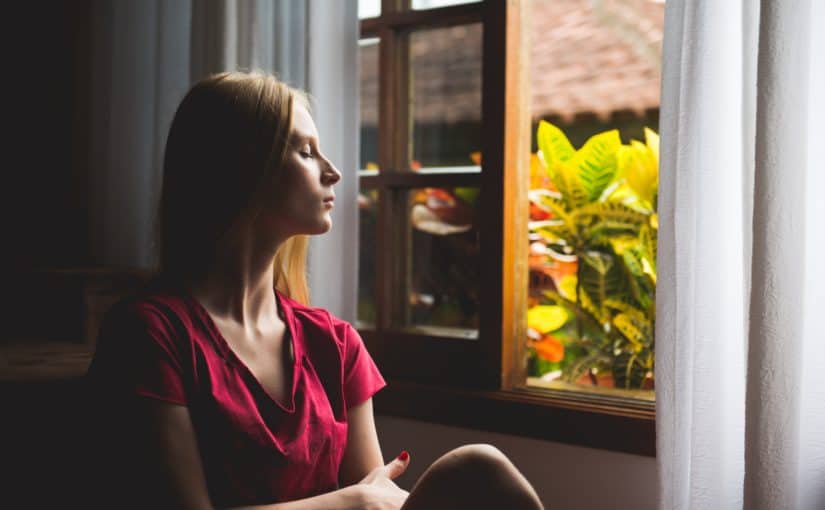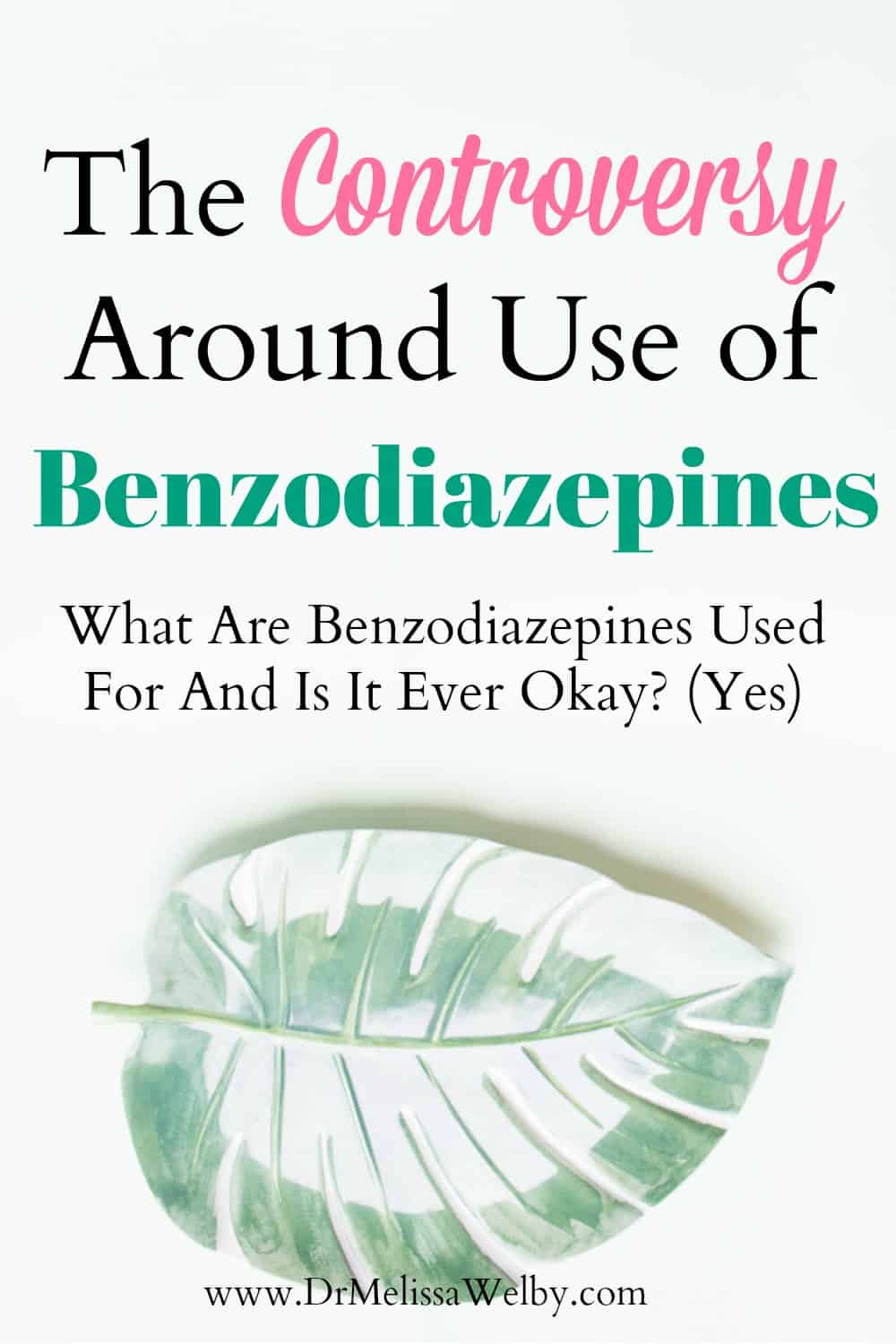Benzodiazepine medications have gotten a bad rap and there is much controversy in the psychiatric community about their use. Some people feel they should never be used and some feel they are highly useful. Like most areas of life, there is likely a middle ground- sometimes the use of benzodiazepines is essential and quite helpful…sometimes they are harmful and impede the progress of treatment. Let’s look at some situations where a benzodiazepine could be useful or could be potentially harmful. But before we do that, I will review some definitions and basics. What is a benzodiazepine? What are benzodiazepines used for? And then we can break down situations where they may be helpful for treatment or should be avoided.
There are effective techniques to get rid of anxious thinking. Download this worksheet so you can start taking control back now!
What is a benzodiazepine?
There are different types of treatments for anxiety and one of the medications used is called a benzodiazepine. Think of the word “benzodiazepine” as the last name for a family and the individual medications are the family members. The individual members of the benzodiazepine family are medications like Xanax/ alprazolam, Ativan/ lorazepam, Klonopin/ clonazepam, Valium/ diazepam, etc…
The medications in the family are all similar but they vary in how fast they take effect and how long they last.
What are benzodiazepines used for?
These are called anxiolytic medications which means they work to alleviate anxiety. But benzodiazepines don’t prevent anxiety. They are a bandaid that helps to minimize it when it happens. Similar to taking ibuprofen or acetaminophen for a headache, benzodiazepines are taken when someone is feeling anxious. Read more here: Benzodiazepines: Do They Treat Anxiety?
There are other uses for benzodiazepines (for example treating a seizure or alcohol withdrawal) but today we will mainly focus on its uses for anxiety.
Benzodiazepines can be helpful:
1. People with a specific phobia like a fear of flying:
Let’s take the example of someone with a phobia of flying who only has to fly occasionally (if they need to fly more often the treatment would be different).
Is this really a big deal?
Having this phobia may sound like it wouldn’t cause many difficulties in one’s life since most people don’t need to fly often…. until you hear individuals describe how it has changed their life. I have had patients completely alter their professional trajectory out of fear they would need to travel. They have refused promotions because the jobs would involve distant business meetings or decided to change careers entirely to one that will never have that requirement.
This phobia can interfere with family life when people end up staying home from family trips that require flying.
Relief comes from knowing there is a “rescue”
Oftentimes, when a person knows they have a medication that will reduce anxiety before their flight, this is enough for them to stop avoiding travel. They may never love flying, but they know they can get through it when they need to. In this situation, using an as needed benzodiazepine is possibly reasonable (I say possibly because it depends on the particular person’s history. Benzodiazepines are not appropriate for everyone even if the situation is a reasonable one to use it for).
With regular travel, or for someone who wants to eliminate this anxiety forever regardless of how often they travel, there are excellent treatments available:
If a person has to travel regularly, solely having their treatment be an as-needed benzodiazepine isn’t ideal. People can overcome this fear by doing cognitive behavioral therapy (CBT) specifically aimed at addressing their fear of flying. Soar is a great example of a program to address the fear of flying. I love this program because it is created by a pilot who knows everything about airplanes and combines this knowledge to create targeted CBT programs, most of which can be done online. I have had patients terrified of flying use this program who now fly comfortably without the use of any medication.
Watch these videos from Captain Bunn about fear of flying and how to get rid of it.
2. Specific time-limited events:
When someone has a predictable and time-limited situation that causes significant anxiety, an as-needed benzodiazepine may be useful.
Here are some examples of what I mean:
Public speaking: This is an option, however, benzodiazepines aren’t always the best selection for public speaking anxiety. For some people, it works fine but others may feel a bit foggy when they take it. There are other medications (like propranolol) that can be prescribed in this situation and aren’t sedating or cloud thinking.
A particular social event: As long as the social event doesn’t involve drinking alcohol, people who have tremendous anxiety about a situation may be helped by a benzodiazepine before it.
3. Occasional panic attacks:
People that have infrequent, occasional panic attacks may be helped by a benzodiazepine that would be taken when they are starting to have an attack. The medication can interrupt the panic attack shortening its course and lessening its intensity.
If panic attacks are a regular occurrence, benzodiazepines aren’t the most effective treatment. They still may be useful, however other preventative medications combined with therapy targetted to address panic attacks would be recommended.
Dangerous or generally not useful:
1. In combination with an opiate:
This is a potentially dangerous and lethal combination. Although there are many people with chronic pain and severe anxiety who have used this combination safely for years this should be avoided if at all possible. For people with addictions, benzodiazepines can enhance a “high” when combined with an opiate and can increase the chance for a lethal overdose.
2. Frequent panic attacks and daily anxiety
When someone has frequent panic attacks or daily anxiety a preventative medication like an antidepressant and/or therapy such as Cognitive Behavioral Therapy is more useful than a benzodiazepine. When the only treatment is a benzodiazepine, people get in a situation where they end up having to chase the anxiety to keep up with it rather than preventing it from the beginning.
Unfortunately, not all people tolerate antidepressants (the primary preventative treatment for anxiety) so occasionally, benzodiazepines will still need to be used even when their anxiety is daily.
3. During Cognitive Behavioral Therapy and Dialectical Behavioral Therapy
Certain treatments, like cognitive behavioral therapy (CBT) and dialectical behavioral therapy (DBT), need people to experience the situation and the emotions happening in order to practice using skills to get through it. Although this may sound unpleasant, it can be a key in recovery. No longer does someone need to be controlled by the fear of panic or distress if they know they can handle it.
In this type of treatment, taking a benzodiazepine can interfere with learning and practicing coping strategies that will allow a person to overcome panic attacks or episodes of emotional distress on one’s own.
4. People who struggle with addiction, particularly to alcohol
Alcohol and benzodiazepines can be lethal in combination. They have synergistic effects and the results aren’t always predictable. There is cross-dependence between both of these substances as they both affect the same receptors in the body.
The side effects of benzodiazepines and alcohol are similar to each other so using both at the same time can multiply the body’s response and make the symptoms worse. Both benzodiazepines and alcohol slow breathing and a major danger of using them together is it increases the chance that the person will stop breathing.
Sometimes, a person with an addiction, will not take this medication as prescribed and instead use it as a way to escape or feel high (by taking higher doses) and not as a way to alleviate anxiety. Obviously, in this situation, it is not recommended to prescribe the medication.
A side note on addiction potential:
Long term use of benzodiazepine medications can cause physiological dependency and withdrawal. This is not the same as addiction. What this means is that we need to taper benzodiazepines slowly to help avoid physical withdrawal.
There is no physical dependence that happens when these medications are not taken daily.
Benzodiazepines: Good or bad?
Like in all parts of life, things generally aren’t all-or-nothing and don’t fall into black and white categories crisply delineating them as good or bad (read more about black and white thinking here). Benzodiazepine medications have a bad rap (sometimes for a very good reason) but can also be extremely helpful for the right type of situation in the appropriate person.
Ask your physician if you are wondering if a benzodiazepine would be helpful for you.
Learn more about controlling and treating anxiety. Here are my most popular posts:
Shifting Thoughts and Taking Control: Cognitive Restructuring for Anxiety Management
This post has a free worksheet on how to get rid of thoughts related to anxiety so they don’t keep coming! You can also signup to download it here:
The Best Resources for Anxiety
Do what you are afraid of! Stop letting anxiety control you
***There may be affiliate links in this post. I do not recommend anything I would not use myself or recommend to a family member. These links give a small commission to help cover the cost of running this website but cost you no extra money.***
Don't miss another post!

Subscribe to get our latest content by email.








Thank you for writing this article, Melissa! Anxiety is something that I have struggled with for most of my life. Benzodiazepines do get a bad rap. It is very comforting to read articles like this that note it is OKAY to take them in certain situations.
There is a rare treatment that is ALL good or ALL bad. It is all about determining when it is helpful and safe and when it isn’t… I find many people are shamed for using them as if it is always bad. Glad you found the post helpful
This article radically downplays the fact that taking g benzodiazelubes for ANY anxiety instead of developing healthy, sustainable strategies often, very, very often, leads to a slippery slope of more anxiety, benzo dependence, and horrific side effects from tolerance and withdrawal. They should be used in emergency situations and only a few DAYS per a lifetime. They ruin lives. You are downplaying serious, horrific dangers that affect thousands.
Thank you for your comment. I agree that developing healthy sustainable strategies to manage symptoms is ideal. This article is discussing that it is not black/white- benzos aren’t all-bad or all-good. I have seen them be very helpful in the right person and used completely safely. I have also seen the consequences of dependence, addiction or improper tapering. The important point is: they should only be used with proper assessment, discussion, and followup for an appropriate patient. And they should be one part of a treatment plan, not the only treatment.